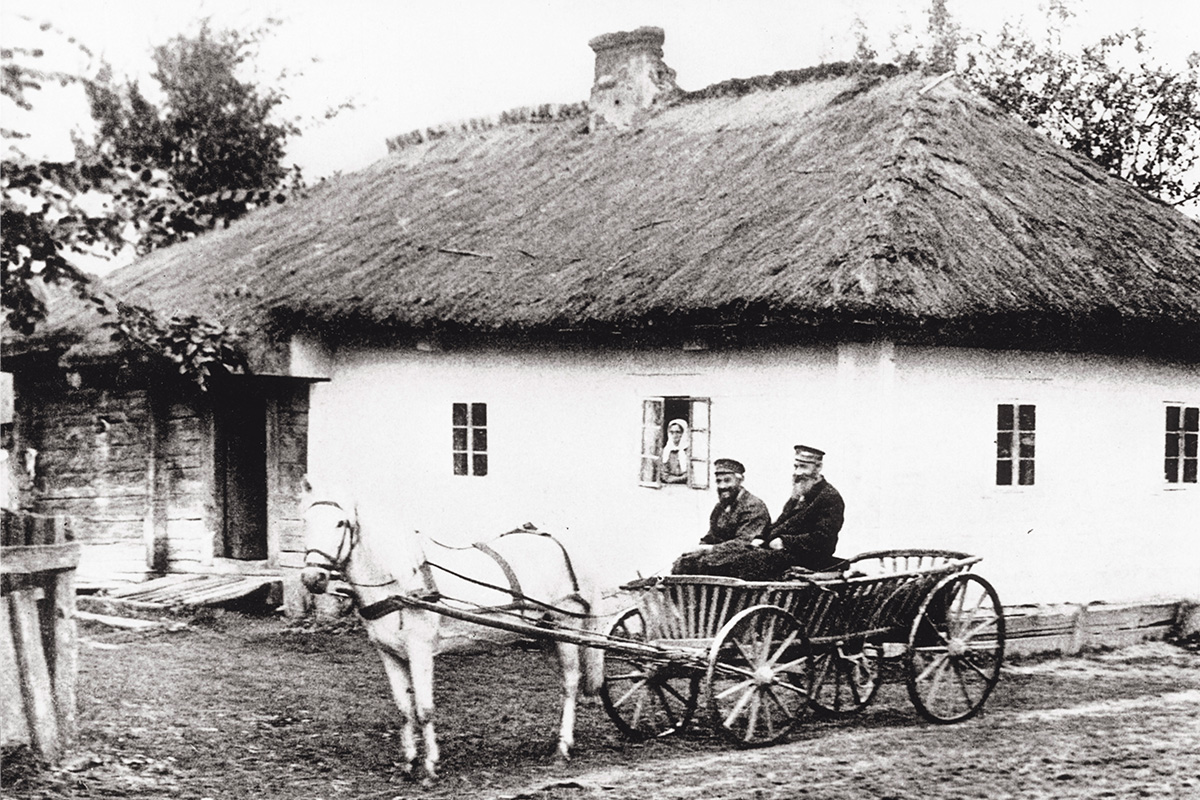This story originally appeared in From the Jewish Provinces: Selected Stories, translated by Jordan D. Finkin and Allison Schachter. Northwestern University Press, 2022. pgs. 27-30.
* * *
The moment Hinde Gitel returned with her new daughter-in-law, the entire town was taken aback: Hinde Gitel’s daughter-in-law was a beauty.
Alter’s wife trembled when she saw her for the first time. She told the other women that being near that radiant face was like being in the presence of royalty.
Did anyone know her name? “Lantsi.”
“Lantsi?”
Hinde Gitel, a widow, sold dairy products from her home. Every year her eldest son, Chaim, set up a stand at the market to sell their dairy goods.
Apart from Chaim there was also Shloymele, all of sixteen.
Hinde Gitel was frightened by this new daughter-in-law. Chaim had wanted her as soon as he set his eyes on her. Even when they learned the matchmaker had lied and there was no dowry, he wouldn’t hear of getting out of it. They got married in that distant city anyway. That’s why Hinde Gitel was so frightened. She thought to herself, What’ll happen later . . .
Soon after the wedding Hinde Gitel hinted that maybe Lantsi should, according to Jewish tradition, finally cut off her hair. But Lantsi stiffened and in a strange voice said, “No.” And that’s how it stood. She did not cut off her hair. Hinde Gitel was beside herself, embarrassed to go into town. But Lantsi’s parents had graciously invited them to pay a visit. Once there, Lantsi’s mother had managed to persuade her to take along a wig to wear over her hair.
However, as soon as Lantsi had arrived at her mother-in-law’s that next morning, much to Hinde Gitel’s dismay, she hid the wig in a drawer, put on a red silk bonnet with cream-colored lace that didn’t entirely cover her hair, and seated herself beside the window. Hinde Gitel walked around sighing. When a braid dared to appear from among the lace, she rushed over to Lantsi, chiding her to conceal her hair: “It’s not allowed, daughter. A Jewish girl is not permitted to go about with her hair.”
But when Lantsi felt her mother-in-law’s hand, she wrested her head away and gave her a look of such haughtiness that it left Hinde Gitel utterly deflated. Then Lantsi uttered three distinct words: “Let me be.”
From then on, Hinde Gitel left her alone.
Everyone else rushed to get a look at her. Women and men alike made any excuse to stop by her window; they came to buy milk just to see her. As soon as they looked into her face they were unable to tear their eyes away.
The butcher who lived behind Hinde Gitel’s house used to enter the slaughterhouse by the back alley. He convinced himself that going through the street was actually faster so every day he’d have to take a look through Hinde Gitel’s window. In truth, those looks backfired on him. He suffered in silence, punishing himself with half days of fasting. But still he had to look. Everyone felt compelled to look. Lantsi drew all to the window so they could look at her and tremble with fear. They suspected some sort of spell.
With eyes gleaming and mouths agape they whispered to one another about her.
She never went outside. She simply stood by the window doing nothing. She could spend a whole day by the window washing her hands, water spattering her silk dress. This bothered Hinde Gitel.
“At home, daughter, it’s a sin to go about in a silk dress. And your hands are as pure as silver; daughter, you mustn’t wash them so much.”
Lantsi responded with measured words that she hadn’t made these clothes just to be kept in the closet and that she would go on washing her hands. She was wary of damaging her dress, but she continued to lather and wash her hands.
The whole thing was obviously beneath her dignity. That house with all the dairy goods. It was no concern of hers. She was constantly preoccupied with herself. Her inner life was a mystery to all but herself. Only she understood why she acted distantly, repulsed at the idea of touching anything, as if all of it was contaminated.
Chaim was an ordinary young man with a small blond beard, who faithfully looked after his business. Until now he had been a young man like any other, but once people caught sight of his young wife, they began looking at him differently. They started paying closer attention, listening to him with greater respect, and never interrupting. They looked for meaning in everything he said and thought, There really must be something to him after all to have such a wife.
People started showing off in front of him, displaying their cleverness, one-upping each other, calling out each other’s mistakes so that Chaim might see and maybe tell her about them.
Alter’s wife recounted one time when she looked in through the window and saw the young wife get up at night, braid her hair, put on that red silk dress, and walk into the priest’s garden. There she busied herself with the flowers, collecting the dew and washing her face. She then went from one garden to the next the whole night, engrossed in the flowers and washing her face. Well, it wasn’t for nothing her face glowed like that.
Some said she bathed in milk, immersing herself every night. It wasn’t for nothing that her hands were as pure as silver.
“Haven’t you seen how she braids her hair at night?” “Seen it myself.”
“It’s not for nothing she walks around wearing a bonnet. Under that bonnet are two long braids. Didn’t cut them off. Such impiety. A Jewish girl.”
Chaim’s younger brother, Shloymele, had been the kind of person to burst out laughing at any little thing. As soon as Lantsi had come into their house, he fell apart. He stopped eating regular meals and turned pale. For the most part he avoided the house. It was only when he went off into the gardens by himself that he wasn’t embarrassed to lift his head because there was no one there to look him in the eye.
Lantsi saw he was falling apart and knew why. After all, she was used to this. So she began paying more attention to him than anyone else and bossing him around.
Once, when he was sitting in the other room, a girl came in for a quart of milk. Lantsi’s great beauty made the girl so self-conscious that she hid her pitcher among the folds of her dress. Shloymele ran in from the other room, took the pitcher from the girl, and measured out a quart of milk.
When the girl handed Lantsi the six kreuzer, Lantsi didn’t want to take them and said to Shloymele, “Take it.”
“No, it is for you to take.”
“You don’t need to be so formal with your sister-in-law. Go ahead and take it.”
He took the six kreuzer and for the rest of the day went about in a daze— You don’t need to be so formal with your sister-in-law... go ahead and take it…
That evening Shloymele paid closer attention to Chaim. He saw a strange look in Chaim’s eyes that he had never seen before. His brother had somehow become more dignified. He looked like he wanted to take the world by storm. He kept talking about Lashkowitz, how he was in a hurry to go to Lashkowitz to get gifts for her.
And her? Lantsi? She didn’t look at him. She just kept brushing off her dress, and running her fingers through her hair. She wasn’t going to wear any wigs.
One time, after supper, when Chaim went out to take care of the cows, she called to him, “Shloymele. One of my shoes has been pinching me. The white satin one. Go and take it to the cobbler, will you?”
She took out a white satin shoe and handed it to him.
“Look, here’s where it’s pinching me.” As she leaned over him, he could smell her hair. His head reeled; he thought he was going to die.
She leaned over him, closer and closer, holding her satin shoe, letting him smell her hair.
Her voice jolted him: “Shloymele!”
It was the first time she had called him by his name.
The sound of her “Shloymele” never left him alone. It wound itself around him like a snake, a sweet snake, squeezing the life out of him.
In the cobbler’s dark vestibule he took the shoe out of its box, removed his velvet hat, and put the shoe inside.
His forehead started to burn.
There she sat in her bonnet, looking out the window. Whenever a woman came in for some milk, she would stand up, take a look at the woman and at her milk pails, and say haughtily, “Measure it out yourself!” Once the astonished woman had measured her milk and paid the six kreuzer, Lantsi would put the money in a cup on the sideboard, look the woman in the eyes, wash her hands, and go back to the window.
In town people began to say that it was not for nothing that their neighbor Menachem had started going around like a crazy man. More and more often people recounted how she would get up at night, braid her hair, and go from one garden to the next.
Alter’s wife swore, “I’ve seen it myself, how she washes her face among the flowers at night. It’s not for nothing her face glows like that.”
And others swore, “She bathes in milk. Every night she takes a bath in milk. It’s not for nothing her hands are like silver…”
* * *
Translated by Jordan D. Finkin and Allison Schacter. Jordan D. Finkin is the rare book librarian at Hebrew Union College–Jewish Institute of Religion in Cincinnati. He is the author of “Exile as Home: The Cosmopolitan Poetics of Leyb Naydus” and “An Inch or Two of Time: Time and Space in Jewish Modernisms.” Allison Schacter is an associate professor of Jewish studies, English, and Russian and East European studies at Vanderbilt University. She is the author of “Diasporic Modernisms: Hebrew and Yiddish Literature in the Twentieth Century.”
Copyright © 2022 by Northwestern University. Published 2022 by Northwestern University Press. All rights reserved.



